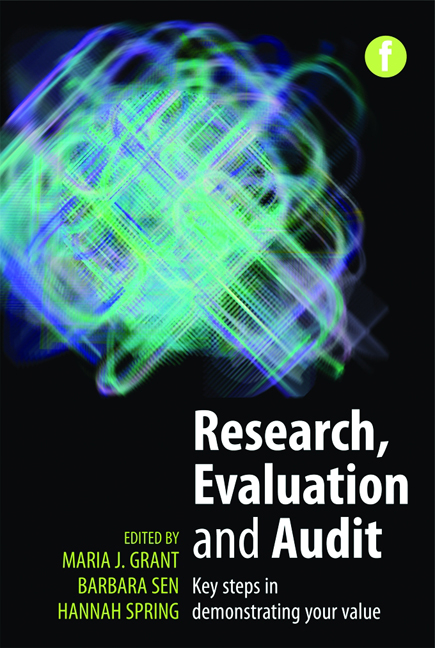Book contents
- Frontmatter
- Contents
- About the Editors
- Contributor
- Foreword
- Preface
- PART 1 GETTING STARTED
- 1 What are research, evaluation and audit?
- 2 Building confidence
- 3 Asking the right question
- 4 Writing your project plan
- 5 Ethics and best practice
- PART 2 DOING RESEARCH, EVALUATION AND AUDIT
- PART 3 IMPACT OF RESEARCH, EVALUATION AND AUDIT
- Closing remarks
- Index
2 - Building confidence
from PART 1 - GETTING STARTED
Published online by Cambridge University Press: 08 June 2018
- Frontmatter
- Contents
- About the Editors
- Contributor
- Foreword
- Preface
- PART 1 GETTING STARTED
- 1 What are research, evaluation and audit?
- 2 Building confidence
- 3 Asking the right question
- 4 Writing your project plan
- 5 Ethics and best practice
- PART 2 DOING RESEARCH, EVALUATION AND AUDIT
- PART 3 IMPACT OF RESEARCH, EVALUATION AND AUDIT
- Closing remarks
- Index
Summary
‘Audit? I really don't feel confident about how to start!’
‘I feel very unsure about what skills I need to carry out an evaluation in my workplace.’
‘I would love to be researchactive but don't feel I have enough understanding of how to go about it.’
In a stretched global economic environment, evidencebased practice has a key role to play in demonstrating the value, impact and importance of library and information services. Evidencebased practice provides library and information science (LIS) practitioners with a platform from which to support both decisionmaking and their accountability within the organization, and research, evaluation and audit are often the fundamental elements that underpin it. Using research to inform practice is therefore a key component of evidencebased practice (Crumley and Koufogiannakis, 2002), and the benefits of research in informing LIS practice have been highlighted elsewhere in the literature (Clapton, 2010; Hall, 2010). For these reasons, it is becoming increasingly important for information practitioners to carry out research within the workplace (Hallam and Partridge, 2006).
This chapter aims to provide a useful starting point to help you begin building confidence in doing research, evaluation or audit. A collection of ideas, examples, and supportive, practical solutions will be offered to help you begin your first steps into practical LIS research. This chapter begins by discussing some of the common barriers to engaging in research, evaluation or audit by LIS practitioners and is followed by a section covering ideas and techniques for collaboration. Further sections include advice on guiding and mentoring, using research diaries and getting involved with research networks. It is hoped that the approaches to building confidence offered in this chapter will provide you with the resolve you need to begin getting involved in these types of activities and/or to begin your own project.
Barriers to engagement in research, evaluation or audit
As highlighted in Chapter 1, the term ‘research’ is often associated with empirical research carried out by academics, and this can often make it seem inaccessible and intimidating to those in LIS practice (Feather, 2009; Lawal, 2009). Furthermore, research funded by larger funding bodies may be relevant, but not always applicable at a local level. This issue is often referred to as the ‘research–practice gap’. The gap between LIS practitioners and researchers highlighted here is one area that can prevent active engagement in research by practitioners.
- Type
- Chapter
- Information
- Research, Evaluation and AuditKey steps in demonstrating your value, pp. 15 - 30Publisher: FacetPrint publication year: 2013



